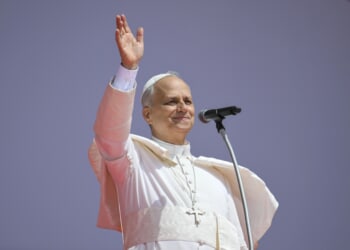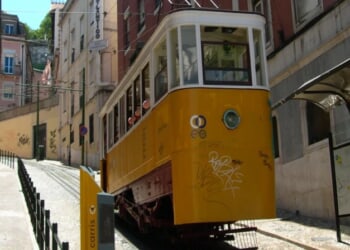Last night I struggled to get home from Parliament’s press gallery because of yet another Tube strike. All the rented bikes had vanished as office workers hunted for any way back from the city. Cabs were nudging £50. Queues stretched round corners just to squeeze onto an already jammed bus.
Londoners face this until Friday morning, when the RMT union finally unlocks the capital’s arteries. By then hundreds of thousands of working days will have been lost and the cost to the economy will top £200 million. And for what? Not safety, not reform, not efficiency. The RMT wants a four-day week on full pay, plus a staff travel perk so generous it would make MPs’ allowances blush.
No transport system in the world runs on a 32-hour week – not Paris, not Tokyo, not Barcelona – but that is what the RMT would like: 32 hours and no loss of pay. This is already with drivers earning salaries between £65,000 and £75,000 a year, plus a pension so generous that most of the private sector has stopped providing anything like it.
That’s not all. A key demand buried in the RMT’s strike is an extension of priv fares, which offer 75 per cent discounts on national rail services. The union wants these privileges extended to every Tube employee.
Is this really about safety? Or is it about perks?
The answer feels obvious. This year, TfL offered another 3.4 per cent pay rise. Tube drivers enjoy a defined-benefit pension that allows retirement on three-quarters of final salary. And yet, after a taxpayer bailout of £3.6 billion in 2020, they are again holding the city to ransom.
The irony is that every strike is likely to hasten the things the RMT fear most: automation or a no strike agreement. Paris, Barcelona, Tokyo, Dubai – all have embraced driverless operations. It is not impossible for London to do the same, but TfL protests that it would cost billions (though asking them is like asking a Turkey to vote for Christmas). This set of strikes alone is costing £230m, and millions more is bled from London’s economy every time the RMT calls a stoppage.
The RMT’s line is almost always the same: automation is unsafe. But safety on the Tube is hardly guaranteed by drivers. Consider the case of Sarah de Lagarde, the woman run over by two separate Northern line trains in 2022, after both drivers failed to see her lying on the tracks – she managed to survive but is now a double amputee. There are video clips of drivers on other lines watching television shows on their phone as they get on with the clearly arduous job.
Tories have long advocated for driverless trains and full-automation. Boris Johnson made the case for them while campaigning for his second term as London Mayor back in 2012. As Prime Minister ten years later he pledged the tube would be fully automated by 2022 (if only). Then transport secretary Grant Shapps tied driverless trains as a condition to TfL’s £200m bailout, telling TfL it would have to look into its feasibility. Sadiq Khan, City Hall’s patron saint of the RMT, has never advocated the idea.
Back in 2016 he said: “I’ll make sure that I’m talking to everyone who runs public transport to make sure there are zero days of strikes. 16 was too many and 35 is a disgrace.”
Khan doesn’t have to worry about Boris’s record of 35 because he has well exceeded that with City Hall Conservatives counting 149 strikes under his watch.
And, for the record, Khan now argues: “I did not make a promise of zero strikes” (but rather a promise to roll up his sleeves to try to make this happen). Not very successfully, eh.
Since 2023, TfL has had the power to enforce a minimum service level of 40 per cent during strikes – similar to France, Spain and Switzerland. Yet the Labour Government plans to repeal it all together as part of the Employment Rights Bill, and in the process had advised public bodies not to use these powers in the meantime. So Londoners, who like me found it took them hours to get home because of the strikes, should know this: you, the customer, who are actually generating economic growth, are being penalised – and with what is effectively political endorsement.
As Samuel Hughes at Works in Progress notes, there is an obvious contrast with the Overground and Elizabeth line; run not by TfL, but by concessionaires. Strikes are rare and not coordinated with the Underground.
There seem to be two routes forward. One is privatisation: a structured private Tube, subject to modern safety regulation, which would see the economic sense in automating as quickly as possible. The other is political will: a mayor prepared to face down the unions, enforce minimum service, and push through reform. Neither looks likely under Sadiq Khan.
Until then, Londoners will go on paying for a city strangled by its own transport network. One run for perks not passengers.





![Gavin Newsom Threatens to 'Punch These Sons of B*thces in the Mouth' [WATCH]](https://www.right2024.com/wp-content/uploads/2025/08/Gavin-Newsom-Threatens-to-Punch-These-Sons-of-Bthces-in-350x250.jpg)
![ICE Arrests Illegal Alien Influencer During Her Livestream in Los Angeles: ‘You Bet We Did’ [WATCH]](https://www.right2024.com/wp-content/uploads/2025/08/ICE-Arrests-Illegal-Alien-Influencer-During-Her-Livestream-in-Los-350x250.jpg)
![Black BET Billionaire Donor Stuns Democrats, Gives $500K to Winsome Earle-Sears [WATCH]](https://www.right2024.com/wp-content/uploads/2025/08/Black-BET-Billionaire-Donor-Stuns-Democrats-Gives-500K-to-Winsome-350x250.jpg)







